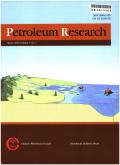基于Mo-Ni基液体催化剂的稠油采收率优化:模拟方法
IF 4
Q1 Earth and Planetary Sciences
引用次数: 0
摘要
近年来,由于重油储量丰富且成本低廉,对其的需求不断增加。然而,稠油的高粘度和低流动性给稠油的提取带来了巨大的挑战。因此,人们开发了各种方法来提高稠油的采收率,包括使用催化剂。这项研究创造了一种独特的模拟方法,使用液体催化剂(lc)来提高稠油采收率。在这项工作中,使用实验室测试数据集和数值模拟研究来研究将lc作为提高稠油采收率的替代化学剂的潜力。使用CMG-STARS和CMOST模块对两个砂包驱实验(三次采油模式下的水驱和液体催化剂驱)的实验室规模结果进行历史匹配。此外,进行了敏感性研究,以应用广泛的假设来确定最有效的过程控制参数。最后,利用遗传算法(粒子群算法)选择最优作业参数,进行产量优化。与典型的水驱相比,结果表明,注入LCs后,稠油采收率(RF)明显提高。仿真结果表明,优化后的生产策略可使最终采收率提高45.06%。注入速度、段塞尺寸和注入温度是稠油产量优化的重要因素。该模拟方法可用于优化不同储层中使用酸性Mo-Ni基液体催化剂的稠油产量。本文章由计算机程序翻译,如有差异,请以英文原文为准。
Production optimization of heavy oil recovery utilizing Mo-Ni based liquid catalysts: A simulation approach
In recent years, the demand for heavy oil has increased due to its abundant availability and low cost. However, the extraction of heavy oil poses a significant challenge due to its high viscosity and low mobility. Therefore, various methods have been developed to enhance the recovery of heavy oil, including the use of catalysts. This study has created a unique simulation approach that uses liquid catalysts (LCs) to improve heavy oil recovery. In this work, laboratory testing dataset and numerical simulation studies were used to examine the potential of applying LCs as an alternative chemical agent for enhancing heavy oil recovery. CMG-STARS and CMOST modules were used to historical match the laboratory scale results of two sand-pack flooding experiments (water flooding and liquid catalyst flooding in tertiary recovery mode). Moreover, a sensitivity study was conducted to apply a wide range of assumptions to determine the most effective process controlling parameters. Finally, oil production optimization is performed using a genetic algorithm (particle swarm optimization) by selecting the optimum-operating parameters. In comparison to typical water flooding, the results revealed a discernible rise in the heavy oil recovery factor (RF) when injecting LCs. The simulation results showed that the optimized production strategy could increase the ultimate oil recovery by up to 45.06%. The injection rate, slug size, and injection temperature were found to be significant factors in optimizing the production of heavy oil. This simulation approach can be used to optimize the production of heavy oil using acidic Mo-Ni based liquid catalyst in different reservoirs.
求助全文
通过发布文献求助,成功后即可免费获取论文全文。
去求助
来源期刊

Petroleum Research
Earth and Planetary Sciences-Geology
CiteScore
7.10
自引率
0.00%
发文量
90
审稿时长
35 weeks
 求助内容:
求助内容: 应助结果提醒方式:
应助结果提醒方式:


